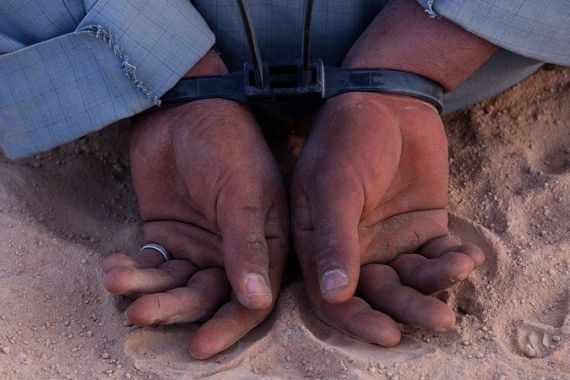UK pays out millions to Iraqi torture victims
Ministry of Defence has spent $22.7m settling claims from 205 Iraqis who alleged abuse by British troops.

Britain has paid out $22.7m to Iraqis who accused UK troops of illegally detaining and torturing them following the 2003 invasion.
The Ministry of Defence (MoD) on Thursday confirmed a report in the Guardian newspaper which revealed that the government had given compensation to 205 complainants over the last five years, with more than 700 claims expected next year.
|
“We will compensate victims of abuse where it is right to do so and seek to ensure that those responsible are brought to justice“ – MoD spokesperson |
Some $13.4m was paid to 162 Iraqis this year, with the average settlement being $113,500 plus costs.
The claims stem back to the five-year occupation of the southeast of the country and have mostly been brought by male civilians who claim they were beaten, threatened and deprived of sleep before being interrogated by British troops.
The ministry confirmed the payouts but defended Britain’s record in Iraq.
“Over 120,000 British troops have served in Iraq and the vast majority have conducted themselves with the highest standards of integrity and professionalism,” said a spokesperson.
“All allegations of abuse will always be investigated thoroughly. We will compensate victims of abuse where it is right to do so and seek to ensure that those responsible are brought to justice.”
In 2010, the ministry set up the the Iraq Historical Allegations Team (IHAT), which is examining the possibility of criminal charges related to the abuse allegations.
IHAT has paid particular attention to the actions of a military intelligence unit called the Joint Forward Interrogation Team (JFIT).
JFIT interrogators filmed themselves threatening and abusing detainees, who appeared in footage to be bruised too tired to stand up. IHAT referred three soldiers to the Service Prosecuting Authority but prosecutors judged that that the incidents did not warrant war-crimes charges.
They ruled that one interrogator had committed offences, but that they were “in accordance with the training that they had been given” and warned against prosecution. A former JFIT guard told the Guardian that he was ordered to drag blindfolded prisoners around assault courses where they could not be filmed.
“[Rather than] a small number of mis-behaving individuals, rights groups say it was a systematic and systemic problem,” said Al Jazeera’s Rory Challands, reporting from London.
“They say the training that troops had been put through led to these problems, [creating] the kind of environment where abuse might happen … that it was not just a few bad apples.”
Death of Iraqi detainee
Meanwhile, a British army doctor who confirmed the death of an Iraqi detainee in 2003 was on Friday banned from practising after a tribunal found he lied about the injuries the civilian had suffered in a beating by British soldiers.
Derek Keilloh, now a family doctor, was struck off the medical register after the Medical Practitioners Tribunal Service (MPTS) found him guilty on Sunday of dishonest conduct over the death of 26-year-old hotel receptionist Baha Mousa.
| Mousa, hotel worker and 26-year-old father of two, was found with 93 visible injuries on his body |
Keilloh, 38, had supervised a failed resuscitation attempt to save Mousa, who had been hooded and severely beaten by British soldiers after his arrest in September 2003 along with nine other suspected insurgents in the war-torn southern city of Basra.
Mousa, a father of two, died 36 hours after his arrest having sustained 93 separate injuries, including fractured ribs and a broken nose, an inquiry last year heard.
Keilloh, then a captain and regimental medical officer, claimed during a later interview, court martial and public inquiry that he had only seen dried blood around Mousa’s nose.
But the MPTS found that the doctor had been aware of the Iraqi’s other injuries from his own observations and from information by other medical staff.
At the end of a marathon 47-day hearing in Manchester, northwest England, the MPTS said Keilloh’s “repeated dishonesty” meant he was no longer fit to work as a doctor.
“The panel determined that erasure is the only appropriate sanction in this case,” MPTS chairman Brian Alderman told Keilloh.
“Given the gravity and nature of the extent and context of your dishonesty, it considers that your misconduct is fundamentally incompatible with continued registration.”
The tribunal found that Keilloh failed to conduct an examination of Mousa’s body or to act to protect the other civilian detainees from mistreatment, and also failed to notify a superior officer of what had happened.
But it recognised that Keilloh had done “everything possible” to save Mousa’s life in a setting that was “highly charged, chaotic, tense and stressful”.